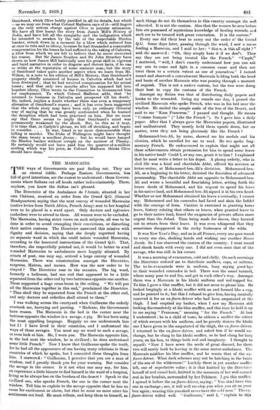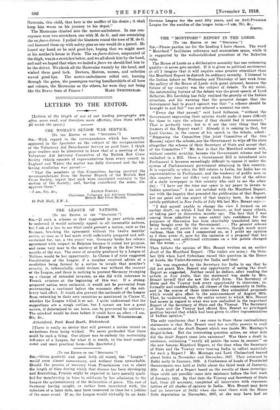THE MAROCAINS.
THE ways of Governments are past finding out. They are an eternal riddle. Perhaps Eastern Governments, less full of good intentions, are the easiest to understand : those Govern- ments where Sultans cut off heads rather indiscriminately. There, anyhow, you know the Sultan isn't pleased.
The Directrice of the Ambulance de l'Armee, situated in her own Chateau, received an order from the Grand Q.G. (General Headquarters) saying that the next convoy of wounded Marocains (native levies from North Africa, French Army) sent to her hospital were to be placed in a ward apart. Only doctors and infirmiers (orderlies) were to attend to them. All women were to be excluded. The Marocains, having strict views on such subjects, all was to be done in order to avoid crumpling their convictions, or disturbing their native customs. The Directrice answered this missive with dignity and decision, saying that she deeply regretted having no separate ward in which she could isolate wounded Marocains, according to the honoured instructions of the Grand Q.G. That, therefore, she respectfully pointed out, it would he better to send wounded Marocains to ambulances more happily situated. By return of post, one may say, arrived a large convoy of wounded Marocains. There was consternation amongst the Directiice, surgeons, Matron, and nurses. How was the new order to be obeyed ? The Directrice rose to the occasion. The big ward, formerly a ballroom, had one end that appeared to be a little separated from the other end by two buttresses opposite one another. Those supported a huge cross-beam in the ceiling. " We will put all the Marocains together in this end," proclaimed the Directrice. " Thus shall they be separated from the French at the other end, and only doctors and orderlies shall attend to them."
I was walking across the courtyard when Guillaume the orderly overtook me, hurrying and panting. " Madame, the Government have reason. The Marocain in the bed in the corner near the buttress opposite the window is a savage, a pig. He has been using the most appalling language. Happily no one understands him but I I I have lived in their countries, and I understand the ways of those savages. You must say no word to such a savage, or even look at him. Me, I warn you. The Marocain opposite him, in the bed next the window, he is civilized ; he does understand some little French." Now I knew that Guillaume spoke the truth, for he had all the appearance of one having many relations in those countries of which he spoke, but I concealed these thoughts from him. I answered " Guillaume, I perceive that you are a man of wisdom, and I greatly thank you for your warning. But consider the savage in the corner. Is it not what one may say, for him, an experience a little bizarre to find himself in the ward of a hospital, living as he always has on the borders of the desert ? Speak to the civilized one, who speaks French, the one in the corner next the window. Tell him to explain to the savage opposite that he has no cause Tor excitement or alarm, but that he must no more utter his sentiments out loud. He must refrain, and keep them to himself, as such things do not do themselves in this country amongst the well educated. It is not the custom. Also that the women he sees before hint are possessed of mysterious knowledge of healing wounds, and such are to be treated with great veneration. It is the custom.'
Every one did their best to carry out the order o' the Grand Q.G. Some days later, passing through the ward, I saw a nurse feeding a Marocain, and I said to her : " Sistn, is this all right ? " and she answered : "Oh, they simply bate it if we don't. They say they are not being treated like the French." "Umphr I muttered, " well, I don't exactly understand how you can ask any one to come and fight in a common cause and then not treat them to a certain extent as one of yourselves." I turned round and observed a convalescent Marocain holding both the head and basin of another Marocain who was passing through a moment of anguish. This is not a native custom, but the two were doing their beet to copy the customs of the French.
Amongst my duties was that of distributing daily papers and books to the wounded. Going my rounds one day, I passed the civilized Marocain who spoke French, who was in his bed near the window. He smiled the simple smile of the Son of the Desert, and said to me " Kam Franceerei." I paused and thought. He meanu " Colima franeais " (" Like the French "). So I gave him a daily paper. After that I always gave the Marocains papers, illustrated and unillustrated. They mostly held them upside down, but no matter, were they not being gloriously like the French ?
Mohammed-ben-Ali, by name, showed me his medals and his citation, which he unrolled for me to read. He toe spoke frag- mentary French. He endeavoured to explain that might not all these achievements obtain permission for him to spend some leave in his native land? Could I, or any ono, grant it to him ? I explained that he must write a letter to his depot. A plump orderly, who in civil life was a kind and charitable Abbe, offered his services as letter-writer, at Mohammed-ben-All's dictation. Mohammed-ben- Ali, as a beginning to his letter, dictated the flourishes of advanced penmanship. The charitable Abbe sat opposite to Mohammed-ben- Ali and wrote a beautiful and flourishing letter, setting forth the brave deeds of Mohammed, and his request to spend his leave in his native land, and Mohammed-ben-Ali signed it in his own hand. Whether or not Mohammed obtained his leave eventually, I cannot say. Mohammed and his comrades had faced and slain the Infidel with the courage of lions. Caution is exercised in granting horns leave, history relating that others as brave, when granted leave to go to their native land, found the exigencies of private affairs more urgent than the Johad. Time being made for slaves, they hurried not to return from their leave. It was even whispered that they sometimes disappeared in the rocky fastnesses of the wilds.
It was New Year's Day, and as in all France, every one goes round to every one else, shaking hands and wishing one another Bonne Annie. So I too observed the custom of the country. I went round and shook hands with every one. I did not even omit that of the savage, who was still in his corner.
It was a morning of evacuation, cold and chilly. On such mornings the Directrice ordered me to distribute mufflers, caps, or mittens. The to-be-evacuateds were in uniform, busy saying good-bye to their wounded comrades in bed. There was the usual turmoil, where many pass to and fro, and get in each other's way. Amongst these was a Marocain in his khaki uniform and red-topped fez. To him I gave a blue muffler, but it did not seem to please him. He looked longingly at a khaki muffler with an end formed like a cap, and he pointed to it; but this I refused to give him, having mentally reserved it for an ex-fiacre.driver who had been amputated at the thigh. I had emptied my basket, when I saw my Marocain still looking disconsolately at his blue muffler, and this time ho held it up to me saying " Franceess," meaning " for the French." At last I understood ; he is a child of taste, he abhors a muffler the colour of which swears with his uniform, and he greatly desires the khaki one I have given to the amputated of the thigh, the ex-fiacre-driver. I returned to the ex-fracre- driver, and asked him if he would ex- change, but he clung to his khaki muffler, as he had clung for long years, on his box, to things both real and imaginary. I thought to myself: "Now I have sown the seeds of great discord, for there" two will surely both be leaving in the same motor-ambulance. The Marocain mislikes his blue muffler, and he wants that of the ex- fiacre- driver. What dark schemes may not be hatching in the brain of the son of the wilderness !" Luckily there is yet another muffler left, one of superlative value ; it is that knitted by the Directrico herself of real camel-hair, knitted in the moments of her well-earned rest in her boudoir, surrounded by her Pekinese. I got this muffler. I spread it before the ex-fiacre-driver, saying: " You she.' have this one in exchange ; see, it will well envelop you when you sit on your box again ; wearing this you shall never have the cold nose." The ex- furore-driver willed well. " Guillaume," said I, " explain to this
Marocain, this child, that here is the muffler of his desire ; it shall keep him warm on his journey to his depot."
The Marocains climbed into the motor-ambulance. In one con- veyance were two stretchers, one with M. de G. and one containing the ex-fiacre-driver. I pulled the blankets round the toes of M. de G. and fastened them up with safety-pins as one would do a parcel. He kissed my hand as he said good-bye, hoping that we might meet at his mother's house in Paris. The ex-fiacre-driver, amputated of the thigh, was in a stretcher below, and we all shook him by the hand, and said we hoped that when we hailed a fiacre we should. fend him to be the driven We shook all the Marocains warmly by the hand, and wished them good luck. Doctors, Matron, nurses, and orderlies waved good-bye. The motor-ambulances rolled out, hooting through the gates, the passengers waving handkerchiefs of all hues and colours, the Marocains as the others, for were they not being



































 Previous page
Previous page